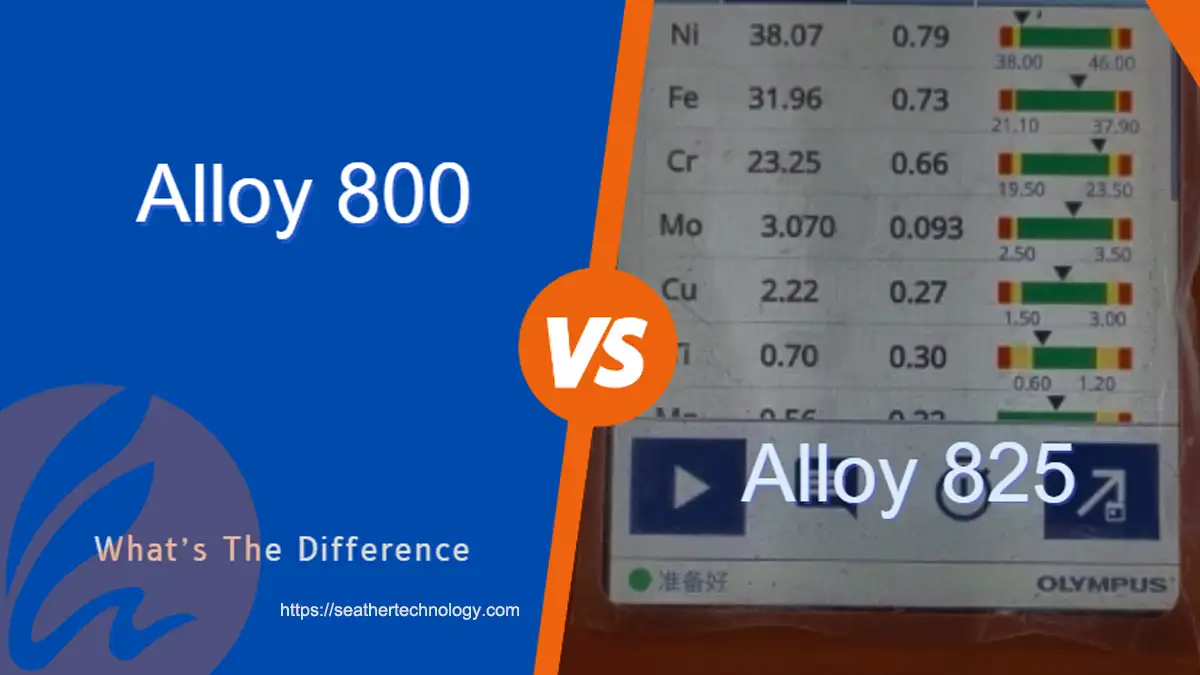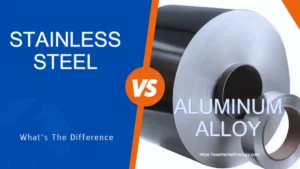Nickel based alloys are known for their excellent high-temperature strength and outstanding corrosion resistance.
Both 800 and 825 alloys are solid solution-strengthened alloys with excellent corrosion resistance properties.
There are some differences in their chemical composition and properties 825 has better corrosion resistance than 800 due to the addition of molybdenum and copper in its composition.
The 825 is mostly used in high-corrosive environments, while 800 is commonly used in high-temperature applications.
800 and 825 alloys are used for producing many types of products like capillary tubes, welded pipes and tubes, thick-walled pipes, sheets, plates, wires, and strips.
This article is beneficial for you if you want to know the differences and similarities between alloy 800 and alloy 825.
What is Alloy 800?
The alloy 800 (UNS N08800 / W.Nr. 1.4876) is frequently used to build equipment resistant to corrosion, strong, stable, and able to withstand service temperatures of up to 1500°F (816°C).
Nickel, iron, and chromium are the basic three contents of alloy 800. Even when exposed to high temperatures over extended periods, the alloy can maintain its stability and austenitic structure. High resistance to oxidizing and reducing conditions, as well as exceptional strength, are other qualities of the alloy.
Because it contains nickel, alloy 800 offers general aqueous medium corrosion resistance as well as resistance to stress corrosion cracking. When temperatures are high, it provides rupture and creeps strength as well as resistance to oxidation and carburization.
This 800 alloy has machining properties comparable to other super iron-based alloys. When this alloy is machined, it often work-hardens. After cold working, 800 alloy may be annealed. The alloy should be air-cooled after annealing at 982°C (1800°F) for 15 minute.
What is Alloy 825?
Nickel, iron, and chromium alloy 825 (UNS N08825 / W.Nr. 2.4858) has titanium, molybdenum, and copper as additional elements.
The chemical composition of the alloy is intended to offer outstanding resistance to various corrosive conditions.
For high levels of corrosion resistance in both moderately oxidizing and moderately reducing settings, the alloy 825 contains high concentrations of chromium, nickel, copper, and molybdenum.
825 alloy has remarkable resistance to crevice corrosion, general corrosion, and chloride stress corrosion cracking due to the balance of alloying elements.
825 alloy is stabilized against intergranular corrosion by the addition of titanium. 825 alloy has high resistance to localized attacks, including pitting and crevice corrosion, as well as to both reducing and oxidizing acids, stress-corrosion cracking, and these types of attacks.
The 825 alloy is particularly resistant to phosphoric and sulfuric acids. This nickel-based alloy is utilized in pickling, acid production, oil and gas well pipe, pollution control, chemical processing, and pollution control equipment.
Difference Between Alloy 800 and Alloy 825
800 alloy and 825 alloy are the same in solid solution structure and strength.
But still, there is a difference in their chemical composition and corrosion resistance properties.
Chemical Composition
800 Alloy Chemical Composition | |||||||
| % | Ni | Cr | Fe | C | Al | Ti | Al+Ti |
| 800 | 30-35 | 19-23 | 39.5 min | 0.10 max | 0.15-0.60 | 0.15-0.60 | 0.30-1.20 |
825 Alloy Chemical Composition(%) | ||||||||||
| Ni | Fe | Cr | Mo | Cu | Ti | C | Mn | S | Si | Al |
| 38.0-46.0 | 22.0 min | 19.5-23.5 | 2.5-3.5 | 1.5-3.0 | 0.6-1.2 | 0.05 max | 1.0 max | 0.03 max | 0.5 max | 0.2 max |
Mechanical Properties
Alloy 800 Mechanical Properties
| The mechanical properties of 800 alloys are displayed in the following table: | ||
| Properties | Metric | Imperial |
| Tensile Strength(annealed) | 600 MPa | 87 ksi |
| Yield Strength(annealed) | 275 MPa | 39.9 ksi |
| Elongation | 45% | 45% |
825 Mechanical Properties
| Tensile Strength, min. | Yield Strength, min. | Elongation, min. | Elastic Modulus | |||
|---|---|---|---|---|---|---|
| Mpa | ksi | Mpa | ksi | % | Gpa | 106psi |
| 690 | 100 | 310 | 45 | 45 | 206 | 29.8 |
Applications
The 800 alloy is mostly used in such kind of applications:
- Furnace for quenching ethylene in boilers
- Vessels, fixtures, and equipment that is open to corrosive attack
- Heat treatment equipment
- Hydrocarbons are breaking apart
The alloy 825 is frequently used for the following purposes:
- Pipes and containers for sulfuric acid
- Acid phosphoric evaporators
- Pickling tanks, equipment, and pickling tank heaters
- Equipment for chemical processes
- Shafts for propellers
- Tanker vans
- Electrodes for electrostatic precipitators
- Hot food, water, and seawater containers, as well as ammonium
sulfate containers - Enlargement bellows
- Exhaust systems for ships
Which one between 800 Alloy and 825 Alloy is better?
825 alloy contains more nickel and less iron. Due to this composition, it has superior basic corrosion resistance.
825 alloy has molybdenum added to it. As a result, compared to 800 alloy, it is more resistant to reducing environments such as sulfuric and phosphoric acids.
825 alloy has strong corrosion resistance at room temperature in addition to having a higher copper content.
All fact shows alloy 825 has better corrosion resistance than alloy 800. 825 alloy has a better purity level and stricter regulation of hazardous ingredients than 800 alloy.
In comparison, the stability of the alloy at high temperatures is largely influenced by the silicon and manganese contents.
The percentage of these two impurity elements is very small in 825.
As a result, 825 alloy is more durable and better than 800 alloy.
Conclusion
Both 800 and 825 are most commonly used in industries due to their outstanding properties.
There is no difference in their strength and high-temperature stability but some differences in corrosion resistance properties.
The price of alloy 800 is less than alloy 825. You can prefer 800 for its less cost if the environment is not more corrosive.
We specialize in the production of premium-grade alloy 800 and 825 products. If you have new project today, please do not hesitate to contact our expert team.






